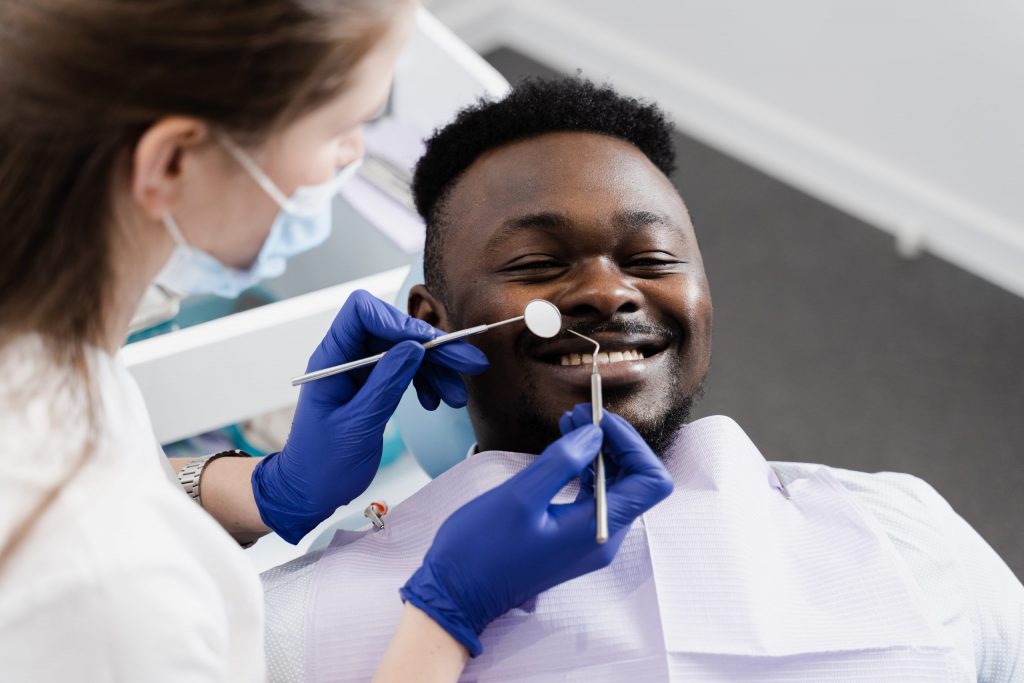Information Library
Start Reading

If you have a severely damaged or decayed tooth, you may need a dental crown.
A crown is a protective cap placed over an affected tooth. It restores the tooth’s strength, function, and appearance. But finding low-cost dental crowns may be a concern.
At Penn Dental Medicine (PDM), we know common myths and misinformation keep patients from pursuing this important dental treatment. Keep reading for the facts about crowns—including how they can be more affordable than you may think.
 Crowns are a proven way to repair teeth damaged in traumatic dental injuries. And when tooth decay has become too extensive for fillings to fix, dentists can place crowns over the remaining tooth structure to restore its function and prevent further damage.
Crowns are a proven way to repair teeth damaged in traumatic dental injuries. And when tooth decay has become too extensive for fillings to fix, dentists can place crowns over the remaining tooth structure to restore its function and prevent further damage.
But a dental crown can also safeguard a tooth that has undergone a root canal procedure or has a large filling. And crowns can enhance teeth’s aesthetics, covering up stains, discoloration, or irregularities. Ultimately, a dental crown provides not only functional but also cosmetic benefits.
Patients who are candidates for crowns sometimes ask, “Can a tooth survive without a crown?” The answer is, only for a matter of weeks—and those weeks will likely be painful.
The compromised tooth will remain exposed. It will stay sensitive to heat, cold, and pressure when you eat and drink. It will be vulnerable to further damage, whether from fractures and cracks or from decay.
Forgoing a crown in hopes your tooth will survive means you’ll almost certainly need more extensive, expensive dental care in the long term. Choose low-cost dental crowns instead of none at all.
Gold crowns, stainless steel crowns, and crowns made of other metals are available. But dentists typically apply these only to molars, where they are all but invisible.
Most patients opt for tooth-colored porcelain or ceramic crowns that perfectly blend in with natural teeth. No one will be able to tell the difference.
 Quality crowns are durable and can last five to 15 years with proper care. But they aren’t unbreakable. If you bite something hard or suffer dental trauma, you could break them.
Quality crowns are durable and can last five to 15 years with proper care. But they aren’t unbreakable. If you bite something hard or suffer dental trauma, you could break them.
The fact that dental crowns don’t last forever does not mean you should avoid them. Again, without a crown, your tooth runs a higher risk of further damage and decay, and you’ll keep feeling discomfort and pain.
To ensure crowns last as long as possible, stick to a schedule of regular dental visits. Regular cleanings extend your crown’s lifetime and allow your dentist to monitor and replace it in a timely way.
This common myth may come from confusion between dental crowns and dental implants.
An implant can’t develop cavities because it replaces an entire tooth. Crowns cover a natural tooth, which remains vulnerable to decay.
Taking care of your crowns as part of your regular oral hygiene routine helps you get the most out of them. It also helps keep dental crowns affordable over the long run.
 Now that you know more about crowns, you’re likely asking, “How much does it cost to get a crown on your tooth?” A crown typically costs between $1,000 and $3,500, depending on the type of crown used.
Now that you know more about crowns, you’re likely asking, “How much does it cost to get a crown on your tooth?” A crown typically costs between $1,000 and $3,500, depending on the type of crown used.
That price tag might make you think, “Why are dental crowns so expensive?” Most of the cost comes from the time, labor, and materials used to make them.
Crowns are designed to fit your tooth. Ensuring they fit correctly is critical to preserving or improving your bite. Making crowns match your other teeth’s color matters for your satisfaction with your smile.
Are dental crowns worth the money? Weigh the cost against the benefits. As noted, crowns can last up to 15 years with proper care and regular dental visits. You’ll spend less on potential follow-up treatments compared to other options.
Crowns are an investment in good oral health.
Patients also ask, “How can I save money on dental crowns?”
To save money, you don’t have to settle for cheap dental crowns of substandard materials. High-quality, low-cost dental crowns do exist. You’ll find them at PDM.
A teaching clinic of the University of Pennsylvania School of Dental Medicine, PDM offers low-cost, affordable, and quality dentistry. We use industry-standard materials and advanced techniques to make crowns. The student dentists who place them are in the final stages of their dental education, overseen by experienced, professional dentists.
Our mission as a dental school clinic means dental services cost significantly less at PDM than at private practices. We are a great place to find affordable dental crowns for seniors and dental crowns for low-income budgets.
We accept direct payments from most dental insurance plans, including Medicaid plans available to Southeastern Pennsylvania residents. And we work with qualifying patients to establish budget-friendly payment plans and financing options.
Don’t let myths and misconceptions about dental crowns and their cost keep you from the strong and healthy smile you deserve. Schedule your free consultation with PDM today.